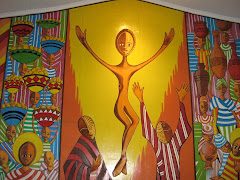



AFRICA : Hopes for the Second African Synod by Peter Henriot, S.J., (The following article appears in the September 2009 issue of Hakimani, the e-newsletter of the Jesuit Hakimani Centre, a peace and justice center in East Africa. Fr. Peter Henriot, S.J., is the director of the Jesuit Centre for Theological Reflection, Lusaka, Zambia.)
[When some 200-plus bishops and advisors from all over Africa gather in Rome in October, a special focus will be on how the Catholic Church can best serve the people of this continent.
The Second African Synod (officially called the Second Special Assembly for Africa of the Synod of Bishops) meets October 4-25, with the theme "The Church in Africa in Service to Reconciliation, Justice and Peace: ‘You are the Salt of the Earth…You are the Light of the World.’"(Matthew 5: 13-14)
Preparations - Preparations for the Synod have been going on for the past three years, with efforts of mixed success to involve a cross section of Catholics to explore the significance of the theme and its implications for theological reflection and pastoral practices. I say "mixed success" because in many dioceses and parishes much activity has gone on and in many others very little activity.
In 2006, a set of discussion guidelines (in Latin, Lineamenta) was circulated to prompt early conversations about the theme, inviting an "examination of conscience" about our life as "family of God."
The results of these conversations were then communicated to the Vatican for preparation of the agenda (Instrumentum Laboris) to focus the debates of the Synod. When Pope Benedict XVI visited Cameroon in May, he presented the agenda with a call for reflection and prayer to engage all of us in this important event.
Personally, I am struck by the relevance of the agenda topics to the life of the Church in Africa. There is an honest reflection on the difficulties of implementation of the First African Synod (1994), with clear recognition that many parts of Africa have in the past decade been severely wracked by armed conflicts and ineffective governance. The concrete experience of the Church in relating to this challenging situation is sketched with obvious questions regarding the effectiveness of our responses.
Challenges - Of many points that can be emphasized about the significance of Synod debates and decisions, here are three that seem to me to be very important:
First, is the necessary formation that needs to be done in the church social teaching (CST) across all of the Church – bishops, clergy, religious, laity. There still is too much ignorance of the content of the CST and/or reluctance to take seriously its call for prophetic stances by everyone in the Church.
Many lay people, including those in important positions of government and business; simply do not know about the CST because many priests and pastoral leaders have never communicated its content and challenge in homilies, workshops, catechetical programs, etc.
Second, priority is to put high emphasis upon promotion of the dignity of women in both Church and society. As the agenda clearly notes, "Women and the laity in general are not fully integrated in the Church’s structures of responsibility and the planning of her pastoral programs."
Anti-evangelical cultural and ecclesial attitudes, patterns and structures must be challenged head on by the Synod if any true reconciliation is to be possible.
Third, priority that Synod discussion and decision must address is something which is surprisingly absent from the agenda. This is the topic of environmental concern touching issues such as climate change (global warming), ecological integrity, life-style adjustments, and industrial pollution by new investors coming to the Continent (e.g., in the extractives sector).
Aside from one passing reference to multinational corporations’ not paying adequate attention to the environment, this topic that is so much in the forefront of problems in Africa is not explored. Surely, the actual Synod deliberations will take up the topic! - http://www.jesuithakimani.org/
~~~~~~~~~~~~






